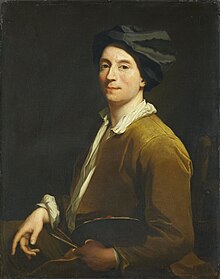Krzysztof Lubieniecki or Christoffel Lubienietzky (1659[1]–1729) was a Polish Baroque painter and engraver active in Amsterdam during the Dutch Golden Age.
Krzysztof Lubieniecki | |
|---|---|
 Self portrait | |
| Born | 1659 |
| Died | 1729 |
| Nationality | Polish |
| Known for | Painting, Engraving |
| Movement | Baroque |
Biography
editKrzysztof Lubieniecki was born in Stettin (today: Szczecin), Pommerania. His brother Teodor Lubieniecki was also a painter and engraver. They learned to paint from the landscape and seascape painter Juriaan Stur in Hamburg.[2] In 1667 they travelled to Amsterdam, where Krzysztof apprenticed with Adriaen Backer, and Teodor with Gerard de Lairesse. In 1682, Teodor moved to Hannover before eventually moving to Poland in 1706, where he died.[3]
Krzysztof remained in Amsterdam, where he painted portraits and genre pieces. He also collaborated on prints for Jacobus Houbraken, Daniël Willink, and Johannes Brandt (son of Gerard Brandt). He died in Amsterdam.
In 1944 a Lubieniecki painting Portrait of a young man was looted from the National Museum of Warsaw by the Nazis during the Warsaw Uprising. It was in turn seized by an American serviceman and not returned to Polish authorities before 2015.[4]
-
Medicine doctor in his studio with assistant preparing medicine.
-
Gourmands.
-
Seller of spectacles.
-
School-teacher,
-
Arent van Buren
-
Portrait of a young man. Looted from the National Museum of Warsaw by the Nazis during the Warsaw Uprising.
References
edit- ^ "Krzysztof Lubieniecki".
- ^ "Home Johann Georg Stuhr". Archived from the original on 2016-03-04.
- ^ Houbraken, Arnold (1718). "Theodorus en Christoffel Lubienietzky biography". De groote schouburgh der Nederlantsche konstschilders en schilderessen. courtesy of the Digital library for Dutch literature
- ^ "FBI — A Wartime Loss Found". FBI.
External links
editMedia related to Krzysztof Lubieniecki at Wikimedia Commons